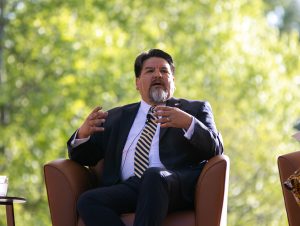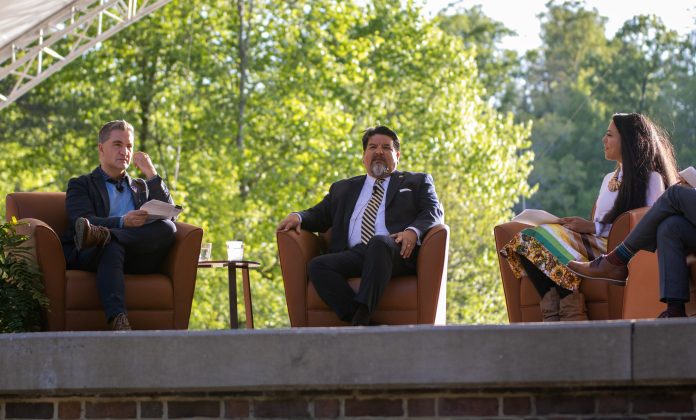Thursday, April 28, the Institute for Integrative Conservation hosted a talk with Charles F. Sams III, the first Native American director of the National Park Service, as a part of their Indigenous Voices in Conservation event. The event was held at the Martha Wren Briggs Amphitheater at Lake Matoaka at the College of William and Mary and addressed how Sams focused on conservation throughout his career and how his Indigenous background has influenced how he views conservation.
The chiefs of Williamsburg area tribes attended the talk, including the chiefs of Rappahannock, Nansemond and the Upper Mattaponi tribes.
The event was moderated the Institute for Integrative Conservation Executive Director Robert Rose, Nansemond Indian scientist Nikki Bass from the Chesapeake Bay and Andrew Fisher, an associate professor of history and the director of the Environment and Sustainability Program at the College.
Rose started the discussion by introducing Sams.
“Director Sams most recently served as Oregon Governor Kate Brown’s appointee to the Pacific Northwest Power and Conservation Council, where he held up a position as a councilmember from March to December of 2021,” Rose said. “Prior to joining the Northwest Council, he served as executive director for the Confederated Tribes of the Umatilla Indian Reservation. For more than 25 years, Director Sams has worked in tribal and state government and in the nonprofit natural resource and conservation management field, with an emphasis on the responsibility of strong stewardship for land preservation for this and figure generations.”

Sams said that his desire to help conserve America’s wildlife came from his tribal ancestry, and traces it back to his Native name, “Mockingbird With Big Heart.” He further went on to discuss how his name and Native culture influenced how he wants to take care of the environment through his position as head of the NPS.
“He said, ‘I’m naming you Mockingbird with Big Heart, and you will go out into the world, you will learn those things best that you can take from other people and bring those gifts home to teach your people to lean back for your founder,’” Sams said. “And so I would say my journey on doing conservation work begins with my naming.”
Fisher and Sams also spent time talking about Sams’s involvement with fish conservation in the Pacific Northwest.
“It’s a challenging time for salmon and many other species including us,” Fisher said. “It’s also an exciting time though, because we have our first Native director of the National Park Service, also our first Native secretary of the interior, and that’s opened up some new possibilities.”
“It’s a challenging time for salmon and many other species including us. It’s also an exciting time though, because we have our first Native director of the National Park Service, also our first Native secretary of the interior, and that’s opened up some new possibilities.”
Sams discussed how he wants to collaborate with the Salmon Corporation to learn more about traditional ecological knowledge and how it relates to tribal sovereignty with tribes whose ancestral lands reside on lands within national parks. He believes that working with Tribal Leaders to integrate their knowledge of their traditional ecological systems with modern ecological scholars would produce the best approach to conserving the land within national parks.
Additionally, many members of the general public, as well as students of the College, were interested in learning more about Sams and his work regarding conservation.
Sophie Bruns ’24 attended the talk to learn more about Sams’ career, and how his background has influenced his work.
“It was such an honor to be in the presence of the country’s first Native American Director of the National Parks Service, Chuck Sams,” Bruns wrote. “I enjoyed learning about his life story and career path, having been born in Oregon as a part of the Umatilla Indian Tribe, working with the Oregon Conservation Corp, going into service, and now directing the National Parks Service. Overall, his talk was very interesting, educational, and most importantly, inspirational to young listeners who have a passion for the outdoors as well as basic human rights and equity for all groups of people.”
Additionally, Sams went on to talk about internship opportunities available to students throughout various fields within the national parks and also offered general advice for students getting ready to enter the workforce.
Towards the end of the discussion, Sams also went on to discuss the importance of diversity within the world of conservation and the NPS.
“Diversity is natural. You look around you and any place on Earth and diversity is natural. The only people that make it unnatural are human beings. We catalog, we categorize. We separate. We put those things apart. But the harder we try to do that, the more nature is going to force us to put it together. And so our job at the National Park Service is to celebrate that diversity, not just for the honor of the human experience on the landscape.”
“Diversity is natural,” Sams said. “You look around you and any place on Earth and diversity is natural. The only people that make it unnatural are human beings. We catalog, we categorize. We separate. We put those things apart. But the harder we try to do that, the more nature is going to force us to put it together. And so our job at the National Park Service is to celebrate that diversity, not just for the honor of the human experience on the landscape.”

